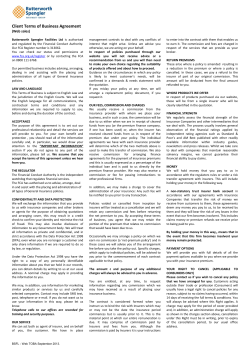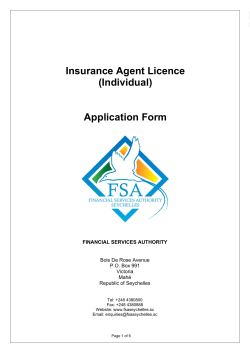
October 2014 Case Advisory (00241205).DOCX
This month we report on two property insurance decisions from the Alabama Supreme Court and the Georgia Court of Appeals. Alabama Supreme Court Holds Policyholders Must Comply with Post-Loss Duties Before Invoking Appraisal The Alabama Supreme Court has issued a decision in favor of insurers, holding that policyholders may not demand appraisal of a loss unless and until they have complied with their post-loss duties to assist the insurer in investigating the claim. (Baldwin Mutual Ins. Co. v. Adair, 30 September 2014) This case arises out of Hurricane Ivan, which struck the Gulf Coast near Mobile, Alabama in 2004. Baldwin Mutual received thousands of claims, adjusted the losses, and made payments based on the adjustments. More than two years after making payments, attorneys for a class of policyholders demanded appraisal of claims on behalf of 130 policyholders. The insurer attempted to investigate the claims further, requesting information to support any dispute the policyholders had over the amounts of the losses. The attorneys for the policyholders refused to provide information, but instead demanded that the insurer resolve the dispute through the appraisal process. The insurer filed a declaratory judgment action, arguing that until the policyholders provided the insurer with information to show what was in dispute, the insurer had no obligation to go to appraisal. The Alabama Supreme Court agreed with the insurer. The Court held the insurer had no obligation to go to appraisal unless and until the policyholders complied with their post-loss duties. These post-loss duties included making the properties available for inspection, providing copies of repair estimates, and submitting to examinations under oath. The court’s ruling should assist insurers in Alabama in exercising their rights to investigate claims. If a policyholder disagrees with an insurer’s adjustment of a loss, the policyholder must cooperate in the further investigation of the disputed issues, and cannot simply demand appraisal or file a lawsuit. Georgia Court of Appeals Limits Scope of Mold Sublimit in Water Damage Claim The Georgia Court of Appeals has held that homeowners who discovered water damage to their home were entitled to coverage for the full policy limit for water damage and ensuing mold damage under their homeowners policy, verdict to the insurer. The trial court ruled that the weight of the evidence showed the property damage was caused by mold, and therefore, the mold sublimit was the maximum amount owed by the insurer. The Court of Appeals reversed the judgment and upheld the jury’s verdict. The Court of Appeals held that the evidence supported the verdict that all the damage to the home was caused by covered water damage, and so the coverage was not limited to the amount of the mold sublimit. The Court of Appeals held that the sublimit applied only to damage caused solely by mold. Here, the court held the hidden water damage caused all the property damage, including the ensuing mold. Therefore, the court held the full policy limit applied. The Court of Appeals also upheld the judgment of bad faith, ruling that the issue of bad faith is ordinarily for the jury to determine. In this case, the court held there was evidence to support the jury’s verdict that the denial of the water damage claim had been in bad faith. notwithstanding a mold sublimit. (Henderson v. Georgia Farm Bureau, 16 July 2014.) In this case, homeowners discovered water damage from a puddle of water in their kitchen. Upon further investigation, it was discovered that there was extreme rotting of floor joists, and black mold was found under floors, behind walls, and over ceilings. This homeowners policy expressly provided coverage for “seepage of water” so long as the water damage was hidden. Covered losses were subject to a policy limit of $153,500. The policy included an additional coverage for mold, with a sublimit of $32,000 for mold damage. The insurer paid the $32,000 for the mold sublimit, but denied coverage for the rest of the damage. The homeowners sued the insurer, and a jury found that the insurer owed them the full amount of the policy limit for covered water damage, as well as a penalty and attorney’s fees for bad faith. The trial court overturned the verdict, granting a judgment notwithstanding the 2
© Copyright 2025










